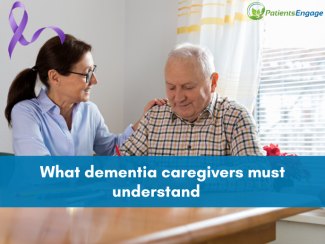
Dementia care is difficult. Caregivers have to be persistent and creative to make the ongoing adjustments required. Swapna Kishore discusses some important aspects that caregivers must understand and accept, and offers some tips to cope better.
It is often assumed that family caregivers will be able to support their loved ones after dementia care is explained to them. But hearing about dementia symptoms or communication methods in a classroom is not enough to make family caregivers give better care in real life. Effective caregiving requires a deeper understanding of dementia and also an emotional acceptance.
हिंदी में पढ़ें: डिमेंशिया (मनोभ्रंश) वाले व्यक्तियों की देखभाल करने वालों को बेहतर देखभाल के लिए क्या समझना चाहिए
Most care-related training focuses on specific techniques: the "how to" aspects. But caregivers may not be ready for the practical and emotional difficulties of using the techniques for a loved one. This leads to unrealistic expectations about how soon they will be able to handle care effectively. Caregivers face problems and experience emotions like frustration, anger, helplessness, guilt, and a sense of inadequacy.
Dementia care is difficult. Caregivers have to understand, accept, and adjust in many ways. They should have a realistic idea of what is involved and why it needs time and effort. Some things to consider:
- Learning new concepts takes time and repetition, and is rarely perfect. As students, it took us many classes and several revisions to pass examinations. And passing exams doesn't necessarily mean we can use the concepts. For example, a student scoring well in the theory of electronics may never be able to repair a TV. Attending a course on dementia concepts is also not enough to be able to provide effective care.
- Changing habits is tough. It takes time and effort, and mistakes are natural. For example, we find it difficult to make even simple diet and exercise changes. Family caregivers have many habits built over years such as how they interact with the loved one, or how they spend their own time and energy. These habits require major changes to provide suitable care.
- There are not enough shared stories, examples, and tips. We typically use conventions and examples around us for many things we do--for example, for bringing up children or cooking. But we do not find such sharing and information in the case of dementia. Families handle dementia in the privacy of their homes because of the stigma. Every family is alone. Others don’t want to get involved.
- Caregiving does not come naturally to everyone. Loving someone who needs care is not enough to make a caregiver effective. Not everyone is good at handling health-care related matters. That is, not everyone can learn or use caregiving and home-nursing techniques well. They may want to give good care, but find the actual tasks difficult, monotonous, or stressful. The work may be emotionally and physically tiring.
Sometimes, we see some families with stress-free, streamlined care. Caregivers still trying to adjust to the role may feel like failures in comparison. It is useful for them to know that families vary a lot in the learning, acceptance, and adjustment required for care.
- There are many differences across persons with dementia. This is because of aspects like the type and severity of dementia, the rate of progression, and the person's health, personality, and needs. Some persons with dementia remain pleasant and co-operative (though confused). Some others may become very aggressive and agitated.
- Family situations vary a lot. Families differ in things like economic and social status, size of the home, living arrangements, available dementia-related support, and other needs and responsibilities of family members.
- Also, caregiving ability changes with experience. Families that seem well-adjusted now may have gone through their learning process earlier. The ability to care effectively usually improves with time and experience. Caregiving becomes less overwhelming. Some families find a satisfactory balance in some months; others may take years.
Caregivers can speed up how soon they understand, accept, and adjust for dementia care. This will make their journey smoother. Here are some suggestions that can help.
- Acknowledge the learning curve and its difficulties. All families face problems and take time reaching a working balance. The understanding and adjustment process is complex. It involves many concepts and skills, and change of habits, and cannot happen in an instant.
- Keep learning and consolidating. Read about dementia. Locate others in similar situations and connect with them. Share doubts, insights, and experiences. Exchange stories about your situations, mistakes, successes, and failures. Use books, website discussions, videos, online forums, and support groups. Select sources that are constructive and correct. Learn to separate valid and useful advice from judgment and criticism, even if both come from the same person.
- Build cues to refocus on effective care techniques through the day. When a loved one is slow at a task, doesn't understand you, or says hurtful things, it is often natural to react emotionally. It becomes difficult to apply the relevant knowledge and skills given that the person has dementia. Use suitable cues to remind yourself of better ways of handling situations. For example, small cards at many places can remind you to breathe deeply and be considerate. Thinking of pictures showing brain changes in dementia can be useful. They make it easier to feel more empathetic in difficult situations, and to apply more suitable ways for caregiving.
In spite of the caregiver's best efforts, not all days will be good. On some days, care will seem smooth, and even easy and pleasant. On other days, caregivers may feel more frustrated and helpless, or make mistakes. Caregivers should not feel unsettled on bad days, and need to be calm and secure so that they can learn from mistakes.
Caregiving requires persistence, creativity and ongoing adjustments. Dementia care goes on for years. Caregivers may have reached a suitable care approach for a person but then the person's dementia may get worse. Caregivers then have to understand the changed status and adjust for it. And along with all this, they have to handle other roles, like their jobs, house work, children, health, other family members, and social obligations. By acknowledging the challenge of their role, caregivers will be less critical of themselves. They will be gentler with themselves and feel less stressed.
Also, if you are trying to support caregivers, you can be more constructive if you appreciate how tough it is to understand dementia and use suitable care methods in real life.
Swapna Kishore, a resource person in dementia, has created many online resources for dementia caregivers in India. These include the website, Dementia Care Notes, and its Hindi version, Dementia Hindi.
More by Swapna Kishore
Understand how Dementia is affecting your loved one








